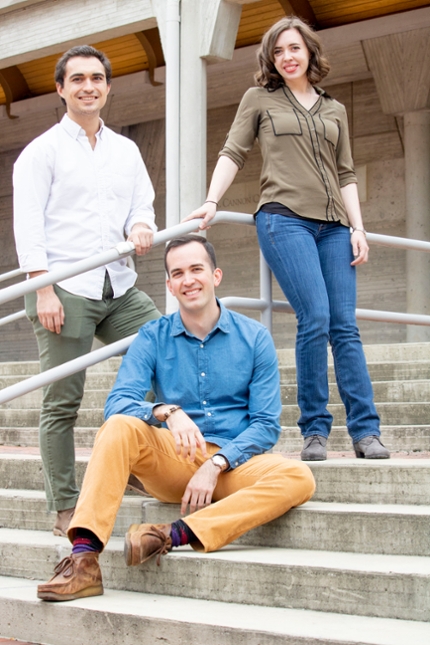Beyond the Classroom

Graduate Students from Laney's Mathematics program facilitate year-round math enrichment sessions for local grade school students. Pictured (L–R): Morrow Jackson, Brad Elliot, and Lea Benish.
Analysts, policymakers, educators and pundits often say that for the United States to compete in the global race for innovation, it must regain its edge in STEM education and training at all levels, including K–12. While some may cringe at the mere thought of numbers and symbols, three LGS doctoral students in Mathematics are taking on the challenge of developing the mathematicians of tomorrow at the Emory Math Circle, a free math enrichment program for students in grades 6–12 in the Atlanta area.
We recently caught up with student director Brad Elliot and student instructors Lea Beneish and Jackson Morrow to learn more about this growing initiative.
“Emory Math Circle started five years ago with a former Emory Math PhD student named Sarah Trebat-Leder. Back then, there was only one class level and a couple dozen students.” Since then, the program has grown to eight classes with more than 200 students enrolled.
Elliot credits the Mathematics program and parents for their continued support. “The Emory Mathematics program has been gracious to support us financially this whole time, though we also receive a grant from the National Association of Math Circles, and accept parent donations.”
The Emory Math Circle isn’t your typical tutoring session. “We don’t do the same kind of math that they learn in school, and the emphasis is on learning fun new concepts and thinking about interesting problems,” Says Beneish. Morrow agrees. “The topics discussed in the Emory Math Circle are subjects that are not covered in a typical high school mathematics curriculum.” For example, Morrow has facilitated lectures on a number of subjects including number theory, graph theory and tropical geometry.
“We don't teach lessons in a traditional ‘Here's the method, now practice it 20 times’ way. Instead, we present a problem and let them take a crack at it,” says Elliot. “Our goal is to teach them problem-solving skills while fostering a love of math, not to teach them any particular piece of curriculum.”
And math education doesn’t stop when summer break starts. Beneish leads a summer math event that builds on student excitement about math. “In the summer, I run a program called Week of Math Exploration where the students are introduced to new areas, and the emphasis is entirely on being creative, coming up with questions, and trying to answer them.” Morrow, who volunteered during this past summer’s event, shares the most rewarding takeaway from his involvement. “The most rewarding part is exposing the students to new and exciting mathematics It’s incredibly rewarding to see the students’ enthusiasm and to see them explore their own mathematical curiosity.”
At the end of the day, the goal of this transformative program is to instill a new level of confidence in its students—one driven by passion, rather than need. “Emory Math Circle is an enrichment program; it's not remediation,” says Elliot. “Our students all want to be good at math, and most of them already are. In particular, all of our students want to be here.”
Get Involved
For more information about Emory Math Circle or to get involved, visit is it the Math Circle website or email mathcircle-contact@listserv.emory.